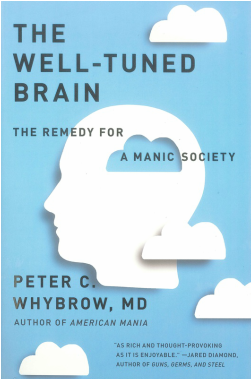
As a psychiatrist and neuroscientist I am interested in human behavior: in who we are, why we behave the way we do, and how together we can build a commonsense, sustainable future.
In my last book, American Mania: When More Is Not Enough
(W. W. Norton, 2005) I explored from a neuroscience and behavioral perspective the stress, obesity, anxiety and time urgency that are associated with a materially rich, demand driven lifestyle.
In the new book, The Well-Tuned Brain: Neuroscience and the Life Well Lived I write about how, through a better understanding of who we are, we might begin not only to repair the damage but to thrive…
New Thinking

“I believe that a broad ranging and open public discussion is now emerging. How can human creativity and imagination help resolve the challenges we face not only through new technologies but also through better understanding of what drives human behavior?
What is it, for example, about the way our brains are wired that makes the risk and competition of the market place so compelling? Why is it that novelty and material goods so hold our fascination that we have yielded up our responsibilities as citizens to become unquestioning consumers?
And what will it take, given this new understanding, to constructively re-channel our energy toward a creativity that better serves both the individual and the common good? I am confident that if we draw upon our collective wisdom and together confront the big questions of today then new ideas will emerge — both to challenge and to inspire…”
New Book – Now in Paperback!

The Well-Tuned Brain is a call to action. Swept along by the cascading advances of today’s technology, most of us take for granted that progress brings improvement. The evidence grows, however, that we are failing to create a sustainable future for humanity. We are out of tune with the planet that nurtures us.
Technology itself is not the problem, as Whybrow explains, but rather our behavior. Throughout its evolution the ancient brain that guides us each day has been focused on short-term survival. But we are also intensely social creatures and learn from each other. This is fortunate. Without the caring behaviors that flow from intimate attachments to others, we would be relying on a brain that is only marginally adapted to the complexity of the problems we must now face together….
New in the Media

Watch Dr. Peter Whybrow on Charlie Rose, speaking about The Well-Tuned Brain.C-Span recently covered Dr. Whybrow in a Book Discussion on The Well-Tuned Brain.Whybrow talked about his book The Well-Tuned Brain: Neuroscience and the Life Well Lived , in which he argues that human brains are not wired for modern society, in which long-term thinking is crucial for survival. He says that humans’ “ancient brain” focuses on short-term survival and responds well to our economic system, which rewards short-term gains, but is not well-suited to deal with major long-term problems like global warming. Watch
Link to more articles and interviews exploring Dr. Whybrow’s research and insights about neuroscience and modern society.